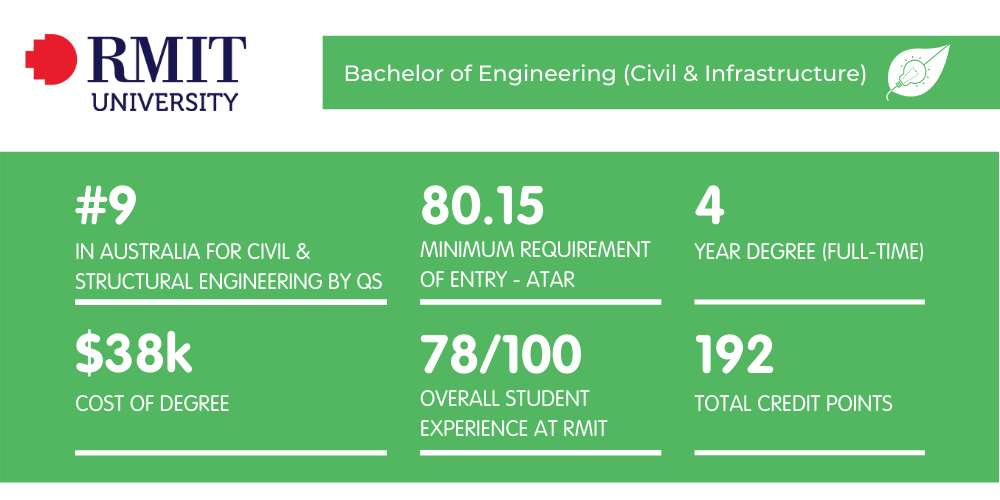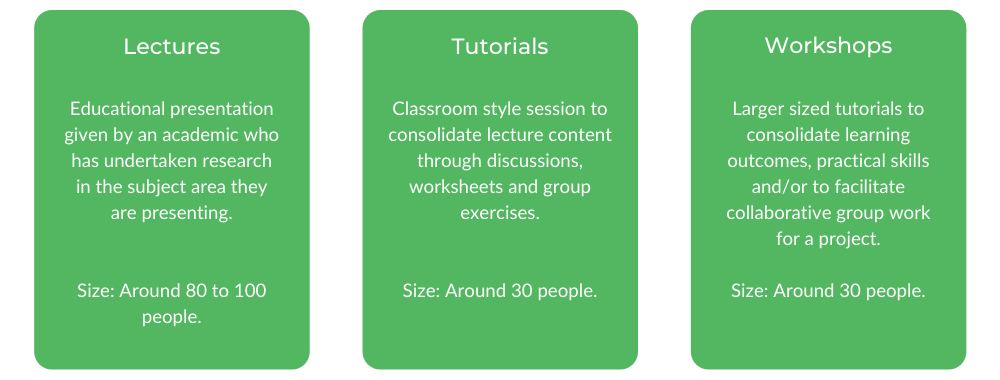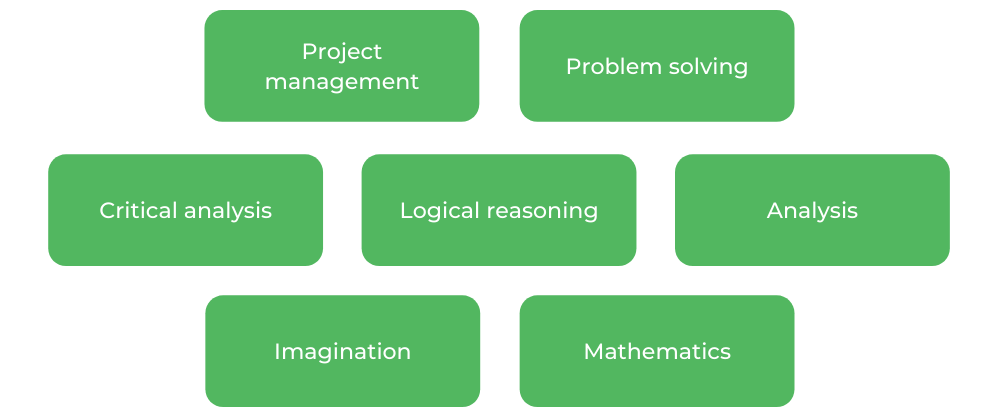
Thinking about a degree in engineering? Are you keen to dive into a specialist field of study and work towards a career? RMIT Civil Engineering might be the program for you!
In this article, we’re going to break down exactly what it’s like to study this degree, so you know just what you’re getting yourself into. You’ll learn about the subjects, careers options and culture.
Sounds good? We think so. Let’s get started!
What is a Bachelor of Engineering (Civil and Infrastructure) at RMIT?
Core Units for this Degree
How to Get into Civil Engineering at RMIT
What’s the Teaching Format?
What’s the Faculty and Culture Like?
What is a Bachelor of Engineering (Civil and Infrastructure) at RMIT?
This degree is based at one of Victoria’s most hands-on unis. You will learn how to plan, design, manage and maintain infrastructure in our communities. This could include designing buildings, train lines, being on construction sites or going into research — there’s a lot of scope!
A great thing about this degree is that it comes with inbuilt Honours. You’ll be able to dodge the stress of applications and GPA minimums part-way through your degree.
You’ll also be able to understand the kind of specialist study available to you, early on.
Career Paths
As we said before, there’s options, options, so many options with this degree! Studying a Bachelor of Engineering (Civil and Infrastructure) could take you into areas such as:
-
- Water engineering (flood modelling)
- Civil engineering (drainage design, water catchments)
- Transport engineering (road and rail design)
- Structural engineering (high rise buildings, residential housing, current condition assessments)
- Geotechnical engineering (design of structural foundations, identification of soil capacities/strength)
- Construction (on-site build of structures/infrastructure)
- Safety assurance (ensuring safe processes)
You may be on the construction site, or you could be the person designing in an office. You may even go into research to advance understanding in the Engineering sector.
Core Units for this Degree
In Civil Engineering at RMIT, your major has already been selected for you when you enrol. You’ll be studying Engineering as your overall degree, with Civil and Infrastructure from the very start.
Some of your subjects will then be general Engineering subjects, whilst others will be specialised.
There is also the option to take on sub-disciplines, including Project Management, Geotechnical Engineering, Transport Engineering, Structural Engineering and Water Resources Engineering. You’ll have a detailed study life, despite learning lots about Civil and Infrastructure as a whole.
Let’s have a look at the core subjects for this degree.
First Year
In your first year, you’ll be taking the following subjects:
-
- Introduction to Professional Engineering Practice
- Digital Fundamentals
- Engineering Science
- Creative Engineering CAD
- Engineering Mathematics
- Introduction to Civil and Infrastructure Engineering
- Site Investigation Geology and Surveying
- Engineering Economics and Infrastructure planning
First year is the overview year. Students will learn the basics in engineering concepts, including how these may translate to their career.
In Digital Fundamentals, students learn how to problem solve common issues. They’ll also learn how to write, test and debug programs. Similarly, CAD (or Computer Aided Science) will teach students how to transform a design concept into reality, developing 2D and 3D models. You will learn different drawing techniques and specific software.
Away from design, students also learn how infrastructure impacts the socioeconomic and environmental climates of communities. Students are encouraged to use economic analysis to gain a holistic understanding of engineering’s role in society.
In first year, you’ll also dive straight into your Civil and Infrastructure major!
In the introductory course, you’ll learn some basic terms like vectors, forces, equilibrium of plane bodies — a whole lot of fun stuff! You’ll also learn about basic construction practice, including techniques in building bridges and buildings.
Second Year
Your second year will see you studying these subjects:
-
- Structural Analysis
- Steel Structures 1
- Engineering Practice 3 — Mathematical Modelling for Engineers
- Water Engineering
- Concrete Structures 1
- Transport Engineering 1
- Geotechnical Engineering 1
As you can see, second year is when you really start getting into the practical aspects of your degree! Students study the first subject of every sub-discipline, which will help you discover what you enjoy most. You’ll also get to take on one elective in second year, so that’s a bonus!
In Structural Analysis, students will learn how to model and design different structural elements, evaluating their work as they go. This will be useful when embarking on each other subject, which introduce key concepts for different areas of engineering.
In Water Engineering, for example, students learnt the fundamental principles of fluid behaviour to understand more about hydraulic design. In Transport Engineering, you will learn how to design, plan and manage transport systems. You will consider sustainability and urban planning within your designs.
Third Year
In third and fourth year, students choose a number of electives to accompany their core study. The core units are:
-
- Engineering Practice 5: Construction Management
- Geotechnical Engineering 2
- Analysis of Complex Structures
- Steel Structures 2
- Engineering Practice 6: Sustainable Infrastructure Design
- Research Methods of Engineers
One of the benefits of this degree is that it is incredibly linear, always building on what you have recently learnt.
In third year, students take on a combination of highly practical subjects and more concept-driven units, including Research Methods of Engineers. In this course, you will learn how to address technical challenges in a systematic manner, including how to evaluate academic literature and consider the ethical implications of your work.
In Sustainable Infrastructure Design, you will address the role engineers can have in creating a greener world.
As your practical components process, you’ll develop more key skills to design and roll out different structures. Geotechnical Engineering 2 will teach you all about the foundations needed for different buildings, excavations, retaining walls and slopes. You’ll also get to analyse different projects that involve soil.
Fourth Year
In your final year of study, you’ll complete:
-
- Engineering Capstone Project Part A
- Infrastructure Management
- Engineering Capstone Project Part B
Like most Honours years, your fourth year of study will see you embark on a Capstone, or major project, bringing together knowledge front our degree and further research methods. You will work with a Discipline Coordinator to produce an industry-based project in your chosen fields.
You will need to articulate your project requirements, design and plan, explain all your research and then prove a tangible method to deliver your design. Some students may even see their complete design to fruition. Pretty cool, hey!
In the Infrastructure Management subject, students understand how to oversee a project as an individual, and as part of a network. You will learn how to assess management systems and deliver great outcomes for your customers.
This degree has a lot of different factors. We recommend checking out the full course breakdown, including electives, here.
What about internships and placements?
This degree doesn’t have any compulsory internships, however it is very encouraging of students finding specialist placements.
RMIT Careers lists jobs and placements that are available to students, along with application tips. The university also has a great support network for having your CV and cover letter reviewed or headshots taken through the Careers office.
Students can also use Future Edge as a co-curricular program to increase their employability and chances of finding an internship. This program teaches students soft skills and organises workshops.
RMIT also offers a lot of long and short term overseas exchanges. You can choose to study a whole semester overseas, including at RMIT’s Vietnam campus.
Alternatively, you could take a short study tour to somewhere like China or France to see professional engineers in action.
How to Get into Civil Engineering at RMIT
The ATAR cut-off for guaranteed entry into RMIT Civil Engineering is 80.15.
Prerequisites
Students must have also completed the VCE with a score of at least 30 in EAL or 25 in English other than EAL. You must have also received a score of at least 20 on Maths: Mathematical Methods or Maths: Specialist Mathematics or the equivalent subjects.
However, if you do not meet the requirements for this course, don’t fear! There are some alternative ways to gain entry. RMIT has a number of equity access schemes that considers students’ overall skills and lifestyle.
Alternate Pathways
The Special Entry Access Scheme (SEAS) is designed for students who are mature age, Indigenous, from a regional or rural area, from a non-English speaking background, living with a disability or are from a disadvantaged background.
This program is also open to females applying to a program where females are under-represented (calling all female engineering hopefuls!) To apply, you’ll need to supply your personal information, and the reason you believe you are eligible for this program.
There’s also the Schools Network Access Program (SNAP), which is open to students attending a SNAP partner school. To apply, students must have an ATAR within 20 points of the lowest selection rank (in this case, 60.15) and may be asked to present a folio or interview.
Scholarships
There’s many scholarships available at RMIT. We recommend checking them out to see what you may be eligible for!
What’s the Teaching Format?
RMIT functions over semesters, meaning it has two sessions a year. Generally, Civil Engineering students at RMIT take on four subjects per semester for a full-time load.
Students undertake about four hours of face-to-face work a week for each subject, which is 16 contact hours all together.
Class Structure

Lectures
Each subject usually has a two hour lecture per week and approximately 80 to 100 students attend them. These lectures outline all the core information for the week on each topic.
They are a time for students to get a good overview on a topic and understand their readings or working problems in increased detail. These are not usually interactive, and involve listening to a lecturer in a teach-student environment
Tutorials
Tutorials run for around two hours per subject each week in classes of approximately 30 students. This is an opportunity for students to engage with their peers and tutors in a classroom setting.
Difficult questions can be workshopped and solved, and interactive activities provide students with skills relevant to the lecture but more applicable to their careers. During tutorials, students are expected to be switched on and actively engage with the class.
Workshops
Occasionally, lectures and tutorials will be combined into a three hour workshop with 30 students attending. These sit somewhere between the two normal activities — they are fairly interactive, but also involve listening to an academic and professional.
Assessments
Assessments in this degree vary a lot between individual subjects. Electives in particular, tend to have different structures to core units.
Throughout each subject, there are 2-3 assessments. Usually a first assessment is either individual or group based and worth roughly 20%.
This might be a very practical task, such as a report or design. A mid-semester test usually evaluates students’ technical knowledge and skills.
Almost every subject has a two-hour exam at the end of semester, which summarises all that students have learnt. Subjects might also have small quizzes throughout to ensure students stay on track.
As Engineering is a collaborative career, many of the assignments in this degree are group tasks.
Skills Learnt in this Degree

As this is such a practical degree, students gain skills that will carry them into the workforce. These are both engineering-specific and highly transferable to other areas.
Skills include:
-
- Project management skills
- Critical analysis
- Logical reasoning
- Problem-solving
- Analytical abilities
- Imagination
- Mathematics
This degree engages both practical and theoretical skills that students will use in the real world.
Geoengineering workshops, involving soil and the creation of structures, are a great example. Students would monitor, measure and test their creations, using problem-solving and analysis to deduce the best way of bringing ideas to life. Working in groups or individually, students would get a great understanding of project management skills.
What’s the Faculty and Culture Like?
Civil Engineering at RMIT provides students with great friendships and staff connections. It is quite an academic culture, where students enjoy coming to university and collaborating on tasks.
The Civil and Infrastructure major also has a growing cohort of females studying, which is really encouraging if you’re keen to get into the Engineering sector.

Societies and Clubs
RMIT has so many societies you can get involved in!
The RMIT University Student Union (RUSU) organises networking opportunities for students and overseas many smaller clubs.
Within your own degree, you may like to join The Civil Engineering Student Association (CESA) (P.S. They currently have free membership!) This group organises networking opportunities and hang outs. It’s also a great way to meet students studying the same degree and experiencing similar things.
On the topic of championing female engineers, graduate Eve Smolinska launched Females in RMIT Engineering (FIRE) a couple of years ago. This is a really great club to get to know other female-identifying students in your course. You will network together whilst attending professional events and growing your portfolio.
Mentorship and Support Programs
RMIT offers several elements of student support, spanning all aspects of uni life. For a comprehensive list, check out this page.
Support for Minority Groups
The Ngarara Willim Centre offers support to Indigenous students studying at the university. Here, students can be encouraged in their studies whilst staying connected to culture and other Indigenous people.
RMIT has an Equitable Learning Services Scheme in place for students experiencing a disability or ongoing illness. You may receive help including adjustments to study conditions, different course materials or assistive technology. Some students may also receive assistance during class.
Student Support Advisors are there for anyone who needs assistance with their study! They can give you academic and legal help and are very worth speaking to, especially if you are an international student.
Academic Help
If a Student Support Advisor isn’t quite the right fit, you can also book a one-on-one consultation online to receive help with your coursework or general literacy skills. This might just give you the academic boost you need!
Mentoring
RMIT offers Career Mentoring to students and is a great way to kick-start professional life! You can get assistance in a range of issues, presented online and in person, in groups of individual formats. This is a flexible program where students can find what is right for them!
Learn all about the pros and cons of this degree in our article here!
Lucinda Garbutt-Young hopes to one day be writing for a big-shot newspaper… or maybe just for a friendly magazine in the arts sector. Right now, she is enjoying studying a Bachelor of Public Communication (Public Relations and Journalism) at UTS while she writes on the side. She also loves making coffees for people in her job as a barista, and loves nothing more than a sun shower.


